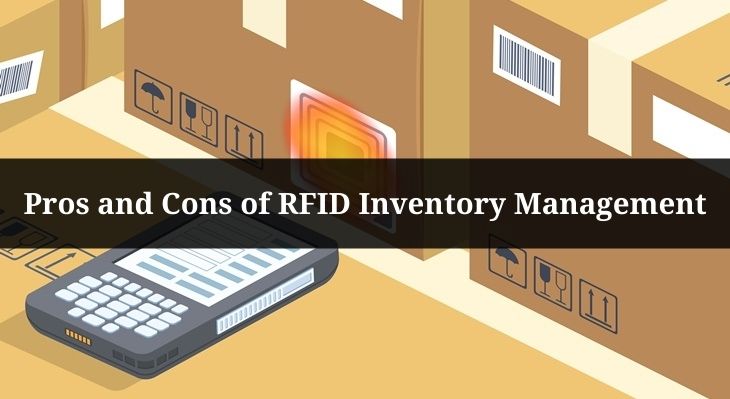The demand for products keeps increasing with accessibility. Companies adopt new technologies to increase efficiency.
Inventory management is the systematic method to manage and store inventory or products. The inventory may include raw materials or finished products.
The inventory management procures, stores, and sells the goods to be processed in a factory or consumed by the end-user.
RFID has transformed and constantly benefits the inventory management industry. Like any other emerging technology, RFID has its own set of pros and cons in inventory management.
Companies need to learn and research new technologies and how they affect their supply chain management. Hence in this article, we will discuss the pros and cons of RFID Inventory Management.
The Pros and Cons of RFID Inventory Management:
What is RFID?
RFID is the acronym for radio-frequency identification. It is the technology that has encoded data regarding a product in a tag or label.
It can be identified or captured by a specific machine with radio waves. RFID is similar to barcode scanning and gathers data.
RFID uses electromagnetic fields, which automates its process of identifying and tracking tags. A reader carries a device that is triggered by the electromagnetic interrogation pulse.
RFID systems consist of small radio transponders, radio receivers, and radio transmitters. The components play an important role in identifying and tracking inventory goods.
While using RFID in inventory management, users require a scanner and an RFID tag for successful communication. The tags contain microchips and enable users to access and edit data if necessary.
There are two types of RFID tags for inventory management:
- Passive Tags: These tags respond to the RFID reader’s interrogation device at close contact.
- Active Tags: These tags are battery-powered and easily identified from a distance of up to 100 meters.
Pros and Cons of Using RFID Tags and technology for Inventory Management
RFID is a comparatively new technology for inventory management. RFID tags have their set of pros and cons in inventory management.
In 2010, there was a massive change in the use of RFID in inventory management due to its pros outshining the cons. Three major factors drove this change: decrease in the cost of equipment and tags, increase in reliability, and stability in the product standard.
Hence to understand the impact of RFID, let’s delve deeper into the advantages and disadvantages.
Advantages of RFID in Inventory Management
-
Control over Inventory
RFID tags provide better inventory control. It tracks and identifies all products that have said tags.
According to Emily Mitchell, COO of Sagitta HPC, “RFID can be most beneficial when it comes to enhanced inventory control and loss prevention, where RFID can help give you much greater visibility into and more granular control over your inventory.”
Companies use multiple channels for the delivery and supply of products. As a result, RFID tags provide better control over understanding the movement of product within the warehouse until it reaches its destination.
-
Enhanced Visibility
RFID Tags track multiple products in the inventory. A company may obtain multiple ranges of products and raw materials.
RFID helps keep an eye on the products as it processes and captures more information. It provides an overview of the supply chain, which leads to better visibility of the products.
-
Faster Scans
RFID tags process and catalog data regarding the products. It scans and identifies data faster than barcode scanners and provides information much efficiently.
-
Improved Inventory Data and Information
One of the main features that RFID tags provide is the procurement of data. When inventory data is stored and easily accessed, it reduces unnecessary efforts and increases productivity.
RFID assigns unique identification numbers to products according to category and amount (cost or quantity) of product. This helps keep track of the inventory and offers retailers insight into the new trends that they can indulge.
This also prevents the over and understocking of products.
-
Reducing the Damages of the Products
RFID helps identify and categorize products according to their nature. Products sometimes may be durable and sometimes perishable.
In this case, it deploys a code that renders that product is perishable or fragile. This allows the products to be stored in a specific manner to maintain their desired state.
There may be times that will lead to transferring critical information. Any sort of confidential or official documents regarding the formula or making of a product. Here, it is vital to add a tag that identifies the parcel as it is and prevents it from disclosing critical data.
Hence, RFID Tags inform the reader of the nature of the products. It notifies them about the necessary measures they ought to take while handling the goods.
-
Reduces Wait Time
A lot of malls, retailers, and raw material sellers utilize RFID tags as it provides visibility over the products.
In this case, it reduces the wait time at the checkout. Individuals may just scan and pay for the products they require and be billed at the self-checkout counters.
It also helps when customers are looking for specific products. Here, a reader can use the RFID tags to check the inventory with another outlet or order the product in advance for the customer.
Disadvantages of RFID in Inventory Management
RFID is a fairly new technology in inventory management and has its pros as well as cons. We discovered the multiple pros that RFID provides for inventory management, and now, let us look at the cons.
-
Security
RFID deals with the data and information of the entire product line. Here, companies, retailers, and sellers are concerned with the level of security it provides.
Also, once a product is bought, unless the tag is not detached, it still continues tracking the product, another major concern for sellers and retailers.
-
Cost and Integration
Companies have already invested and are actively using solutions similar to RFID. It may be an additional cost to discontinue that process and integrate a new one.
In addition to that, readers must be trained thoroughly in utilizing the trackers and understanding the various requirements of the products.
It may hamper the customer’s experience, lead to delays in deliveries, etc. It will be an added cost to the entire supply chain management system.
Conclusion:
The pros and cons of RFID in inventory management are important for companies with a variety of products to offer. Here we can see that the pros of RFID in inventory management outweigh the cons.
Yet companies and retailers are skeptical about investing in it as it may lead to minor discomforts. Although according to recent reports, RFID estimates to reach $10.7 billion this year alone and is predicted to reach $17.4 billion by 2026 with a CAGR of 10.2%.
Also Read:
Understanding Passive RFID Tags

